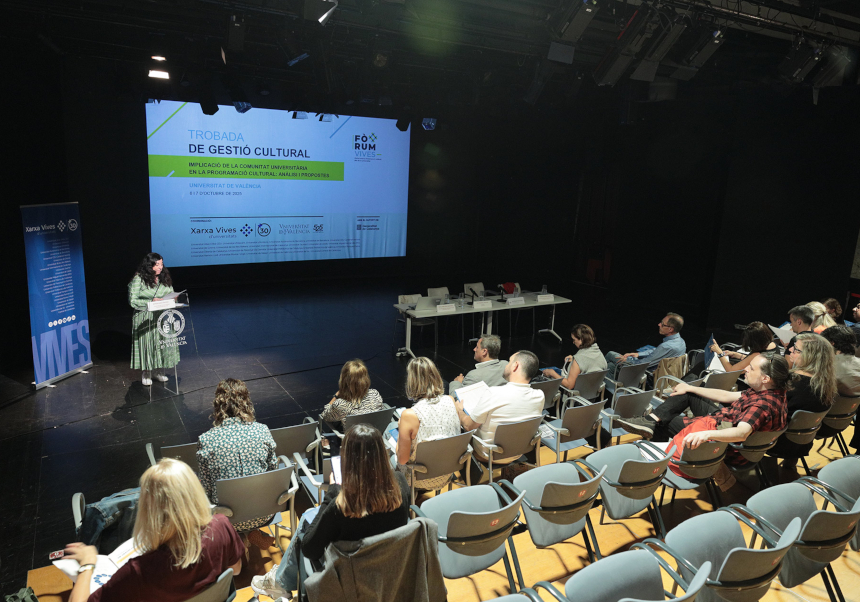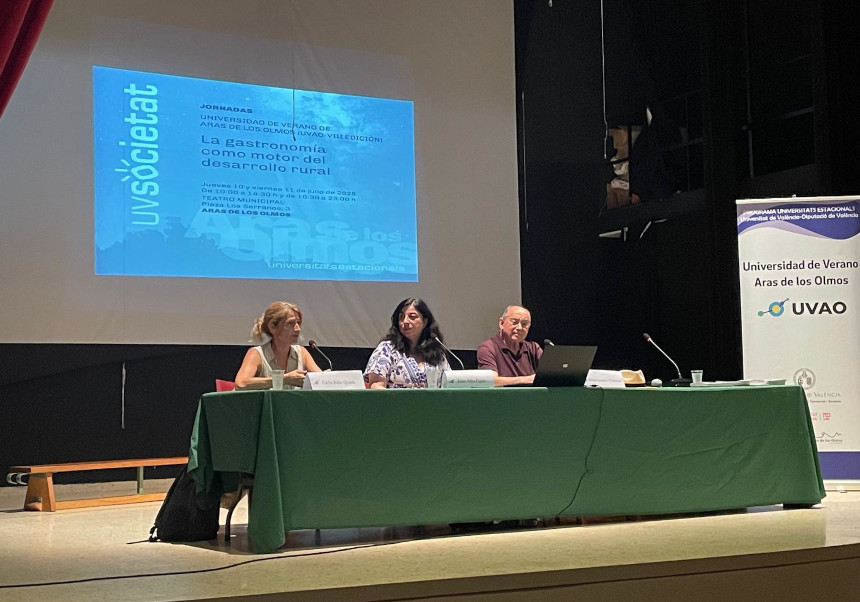The Universitat de València organizes the 1st Expert Conference on climate change and territory in the Iberian Mediterranean
- Office of the Vice-Principal for Culture and Society
- January 31st, 2025
The Universitat de València will hold next 30 and 31 January in the Centre Cultural La Nau the first scientific conference on the connection between climate change and the use and management of the Iberian Mediterranean territory. More than 70 specialists from the principal universities and research centers of Catalonia, the Valencian Community, the Balearic Islands, Murcia and Andalusia will gather in the UV to present evidences regarding the causes and effects of global warming and thus analyses strategies and issue recommendations to the Cortes Generales and the Parlamentos autonómicos. Their objective: make of this gathering the first of a series of meetings that will be held every two years in different universities of the Spanish Mediterranean.
The Principal, Maria Vicenta Mestre, has open the conference, with a combination of historical references, the creation of the UV, in 1499, the origin of the city itself… to illustrate the combination of transformation that the human being has been applying in the territory over the centuries and that has also affected the Iberian Mediterranean, that has described as “one of the most fragile atmospheres of the world”. “We live in times of extreme events, like the increase of the ocean’s temperature, the change of the rainfall regime, desertification, heat waves, fires, a time of climate crisis, despite the denialism of a few”.
In this context, and in request of the Principal, the UV has promoted this first conference, “in a time that has been marked, and will be for a long time”, by the catastrophe caused by the DANA: “Is the founding spirit of the Universitat de València. We have to provide ideas for the public politics, to put science at the service of an intelligent governance. In the end, being a public university at the service of society”, and has underlined that is important to listen to science and that the government act accordingly, because “science is proactive and allows anticipation”. She wanted to conclude her intervention, thanking the daily work of all the teaching and research staff gathered in this conclave and, specially the professors of the UV, Joan Romero, Professor Emeritus of Human Geography y Ana Camarasa, Porfessor of Physical Geography, , for their commitment and special dedication in directing this quote.
Both Camarasa and Romero have express their satisfaction for the “supportive and committed” answer of all the experts that have attended the call of this first meeting in Valencia to propose strategies that will be elevated in the governments. A scientific community, “morally committed”, that has been going on for decades “working in silence” to propose strategies and recommendations to stop climate change.
Climate change, an anthropic cause
One of the main conclusions of the sessions has been that the main cause of global warming are the anthropic activities, that is, the risks caused by the 8,000 millions of humans that inhabit the planet. How we use energy, the way we move around, our tourists habits, the way in which we relate with the territory, the use we make of the water resources, the consumption of goods such as clothes... everything is affecting the emission of greenhouse gases over the 40,000 kilometers of Earth. And what is the state of the matter?, that the temperature of the planet has increased more than 1ºC and the sea level some millimeters, apparently insignificant magnitudes which globally is provoking terrible consequences on the planet and explains many of the “natural” catastrophes.
Throughout the days, it has been analysed in the different panel discussions the effects and strategies recommended in major issues like global warming, water as a resource and risk (drought and floods), the phenomenon of desertification, forest fires, coastal dynamics, extreme episodes, the spatial planning, hydraulic solutions, the most affected productive sectors, risk managements, governance, education in the cities...
Conclusion will be raised to the Outages and the Parliaments
Each thematic block has had a component which, in turn, has coordinated various specialists for the elaboration of recommendations. Thereafter, each thematic area will present a short, medium and long term action plan out of a total of 5-7 concrete measurements. In turn, the Directors of the congress will elaborate, together with the speakers of the thematic areas, a proposal of conclusions and recommendations that will be presented and debated by the plenary session of the meeting and which they plan to hand it on to the Principal next week. Finally, the Principal, will remit those measures to the parliaments of Catalonia, Balearic Islands, Valencian Community, Murcia and Andalusia, as well as to the Cortes Generales (Congress and Senate)
The organizers of this encounter consider that the riverside countries of the UE and of the Ribera Sur face similar challenges. For that reason, she will propose that, in the next editions of the Conference of experts, researchers from universities and researcher centers of the ensemble of the Mediterranean basin can get involved in the works.
The workshop is organised by the UV, through the Escola Europea de Pensament Lluís Vives, and has the collaboration of the Fundació General of the Universitat de València, Caixa Popular and the financial support of the Ministerio de Ciencia, Innovación y Universidades and Conselleria de Educacion, Cultura, Universidades y Empleo.
Categories: Cultura , Conferències i debats , Escola Europea de Pensament Lluís Vives
















